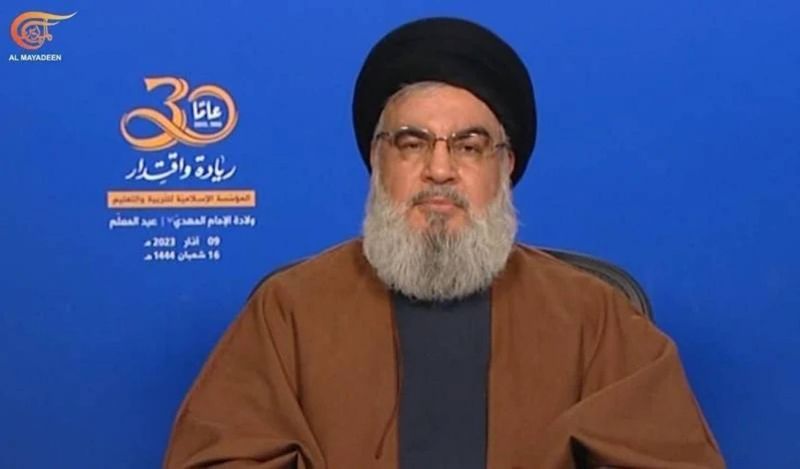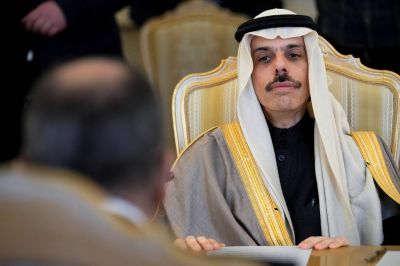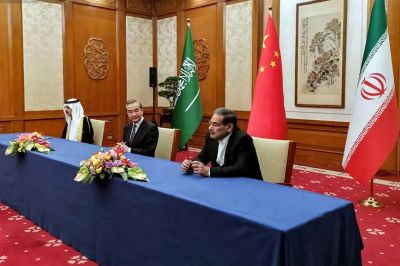
Hezbollah Secretary General Hassan Nasrallah during a televised address Friday, March 10. (Credit: Screenshot from al-Mayadeen website.)
It is now a reality. More than six years after diplomatic ties were severed, and following lengthy negotiations, Iran and Saudi Arabia agreed at a meeting in Beijing to restore ties and reopen their respective embassies within two months. This move should have a significant impact on the region, particularly in Lebanon whose presidential election is locked in a tug of war between the two rivals and their allies on the domestic scene.
“In the absolute, any regional détente can only be translated positively in Lebanon,” says political scientist Karim Bitar.
The diplomatic rupture between the two countries accentuated Lebanon’s political polarization and caused the gradual withdrawal of Saudi Arabia, the state’s main patron. Local political actors are aware of the importance of normalization. They all rushed to welcome the news, each side being convinced that it will emerge stronger.
The most expected reaction was that of Hassan Nasrallah, secretary general of Hezbollah, first because the agreement between the two regional powers concerns him directly, and second because the party is the most influential domestic player.
“The return of relations between Iran and Saudi Arabia is a very welcome step, and will work in favor of the peoples of the region,” Nasrallah said in a speech Friday, stressing, “This important development could open horizons across the whole region, including Lebanon.”
Hezbollah this week formalized its support to the presidential candidacy of Sleiman Frangieh, a central figure of the March 8 camp. Amal and Hezbollah are trying to secure 65 votes to ensure the northern za‘im’s election in the second round, without the support of the two major Christian blocs (Free Patriotic Movement and Lebanese Forces). This task is not in itself impossible, but the possible veto of Saudi Arabia — which sees Frangieh as a pro-Iranian candidate — remains an obstacle. Frangieh himself wants to obtain Arab support for his candidacy in order to avoid a catastrophic mandate in which Lebanon is isolated from the international community and deprived of financial support.
Can the Saudi-Iranian rapprochement play in his favor and forestall a Saudi veto? Hezbollah and its allies seem to be betting on this.
“With time, the normalization of relations will have a positive impact,” says Kassem Kassir, an analyst close to Hezbollah. The party’s secretary general Friday hastened to remind his rivals that regional détente is not enough to elect a head of state, and that internal compromise (especially with him) remains a necessity.
“Don't bet on foreigners [to elect a president],” he warned. “We do not want to impose a president and we want the election to follow its normal course,” he claimed, while Hezbollah’s opponents and even its Aounist allies — who are virulently opposed to the Frangieh option — accuse him of wanting to impose his candidate on Christians.
Lebanon or Yemen?
Riyadh has been disengaged from the Lebanese scene for several years. The prerequisite of its return is the promise of reforms as well as a change in Hezbollah’s attitude toward its influence in Lebanon and Yemen — where the Iranian-backed party is accused of helping the Houthis. Saudi re-engagement is a key factor in a possible alleviation of the crisis in Lebanon, which urgently needs external financial assistance.
Will Riyadh be more flexible after the restoration of relations with Tehran? “In theory, this could pave the way for an improvement in the situation in Lebanon,” says the Carnegie Foundation’s Michael Young, a seasoned observer of Lebanon and the region. “It depends on the conditions of the agreement between the two countries and its implementation.”
According to the communiqué issued by Iran, Saudi Arabia and the deal’s mediator China, both countries have committed to “respect the sovereignty of states and not interfere in their internal affairs.”
In recent weeks, Hezbollah had repeatedly called for dialogue between the various formations to find a way out of the deadlock, while refusing to impose a veto on its candidate. “Let those who want to help Lebanon do so,” Nasrallah said Friday, “but we will not accept that anyone veto on a candidate.”
Young says Saudi Arabia’s position on Lebanon and Hezbollah is mainly linked to the party’s actions. “At the local level, [Saudi] wants Hezbollah to stop trafficking captagon. At the regional level, Hezbollah’s support for the Houthi rebels in Yemen is seen as a national security issue for Riyadh,” the analyst says. “If Hezbollah does not make concessions on this issue, the kingdom should not change its position.”
Can Hezbollah convince Riyadh to give green-light its candidate? “Some may consider that, given the kingdom’s lack of interest in Lebanon compared to Yemen, a barter between the two issues could take place between Iran and Saudi Arabia,” says Bitar. Some observers also believe that the improvement of relations between Riyadh and Damascus, who are moving closer since the Feb 6 earthquake, would increase the chances of Sleiman Frangieh, historically close to the Syrian regime.
“It is up to the Hezbollah camp to bend.”
This is a scenario that the LF, reputedly close to Riyadh, seemingly would not accept. “Riyadh wants the election of a president opposed to corruption and sovereignty ... These are essential principles on which no concessions can be made,” said Razi el-Hajj, LF MP for Metn.
The Saudi ambassador to Lebanon, Walid Bukhari, recently increased his travels, seeming to take a stand on the presidential issue and breaking with Riyadh’s passivity in recent months. As Hajj sees it, then, it is rather up to the other side to make concessions.
“It is up to the Hezbollah camp, which has organic links with Iran, to soften its position by abandoning Sleiman Frangieh’s candidacy and stop blocking the presidential election,” he said, adding, “We hope that the normalization of relations between the two countries will push Iran to act reasonably, rather than [torpedoing] the decisions taken by the international community in Paris.”
Hajj was referring to a February meeting of representatives of France, the US, Egypt, Qatar and Saudi Arabia in the French capital to discuss Lebanon’s predicament. Participating countries agreed on a roadmap to extricate the country from its crisis, calling for the election of a president who does not represent a challenge for any Lebanese actors.
Has the time for compromise come?

